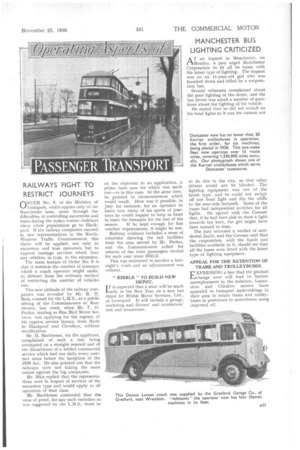RAILWAYS FIGHT TO RESTRICT JOURNEYS
Page 51

If you've noticed an error in this article please click here to report it so we can fix it.
ORDER No. 9, of the Ministry of 16../Transport, which applies only to the Manchester area, arose through the difficulties of controlling excursions and tours during the wakes weeks—holidays when whole populations go to Blackpool. If the railway companies succeed in new representations to the NorthWestern Traffic Commissioners this Order will be applied, not only to excursion and tour operators, but to express carriage services which bear any relation, in type, to the excursion.
The main feature of Order No. 9 is that it restricts the number of journeys which a coach operator might make, as distinct from the ordinary method of restricting the number of vehicles run.
This new attitude of the railway companies was revealed by Mr. R. H. Mais, counsel for the L.M.S., at a public sitting of the Commissioners at Manchester, last week, when Mr. T. H. Parker, trading as Blue Bird Motor Services, was applying for the regrant of his express service licence, from Hyde to Blackpool and Cleveleys, without modification.
Mr. H. Backhouse, for the applicant, complained of such a test being attempted on a straight renewal and of the disturbance of a settled commercial service which had run daily every summer since before the inception of the 1930 Act. He also pointed out that the railways were not taking the same course against the big companies.
Mr. Mais replied that the representations were in respect of services of the excursion type and would apply to all operators of that class.
Mr. Backhouse contended that the onus of proof, for any such variation as was suggested by the L.M.S., must he on the objectors to an application, a prima facie case for which was made out—as in this case. At the same time, he pointed to inconveniences which would result. How was it possible, in July for instance, for an operator to know how many of his quota of journeys he would require to keep in hand to meet the demands for the rest of the season. If he kept enough for fine weather requirements, it might be wet.
Railway evidence included a mass of schedules showing the rail facilities from the area served by Mr. Parker, and the Commissioners called for returns of the train passengers carried for each year since 1931-2.
This was estimated to involve a fortnight's work and an adjournment was ordered.
" RIBBLE "TO BUILD NEW DEPOT.
I T is expected that a start will be made early in the New Year on a new bus depot for Ribble Motor Services, Ltd., at Liverpool. It will include a garage, workshop and drivers' and conductors' rest and messrooms.
MANCHESTER BUS LIGHTING CRITICIZED
AT an inquest in Manchester, on Monday, a jury urged Manchester Corporation to fit all its buses with the latest type of lighting. The inquest was on an 11-year-old girl who was knocked down and killed by a corporation bus.
Several witnesses complained about the poor lighting of the street, and the bus driver was asked a number of questions about the lighting of his vehicle.
He stated that be did not switch on his head lights as it was the custom not
to do this in the city, so that other drivers would not be blinded. The lighting equipment was not of the latest type, and he could not switch off one head light and dip the other to the near-side footpath. Some of the buses had independent Switches for all lights. He agreed with the Coroner that, if he had been able to show a light towards the kerb, the girl might have been warned in time.
The jury returned a verdict of accidental death, and the Coroner said that the corporation, with the funds and facilities available to it, should see that all the buses were fitted with the latest type of lighting equipment.
APPEAL FOR THE RETENTION OF TRAMS AND TROLLEYBUSES.
EXPRESSING a fear that the gradual change over will lead to further unemployment in the industry, Lancashire and Cheshire miners have appealed to transport undertakings in their area to retain trams and trolleybuses in preference to motorbuses using imported oil.




















































































